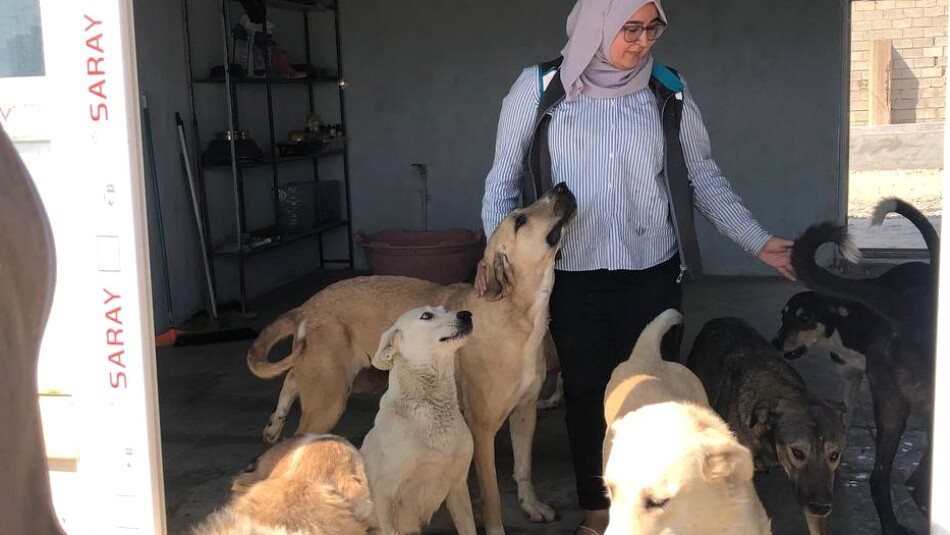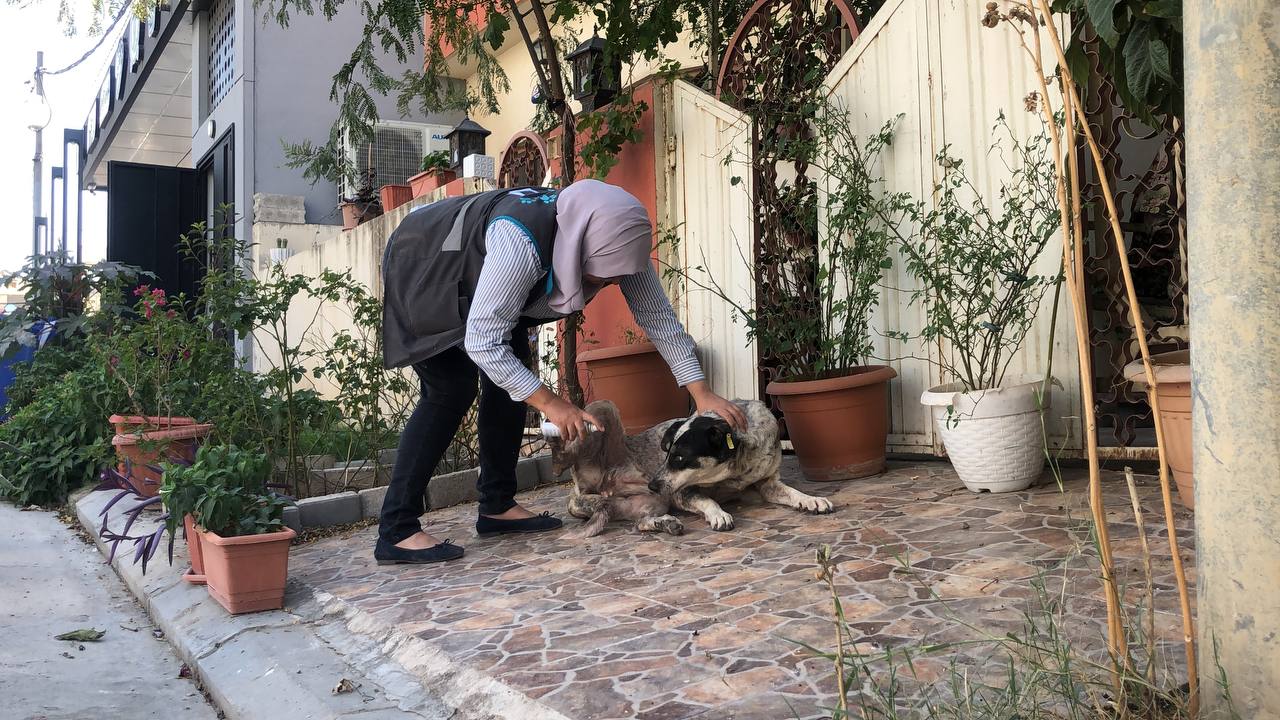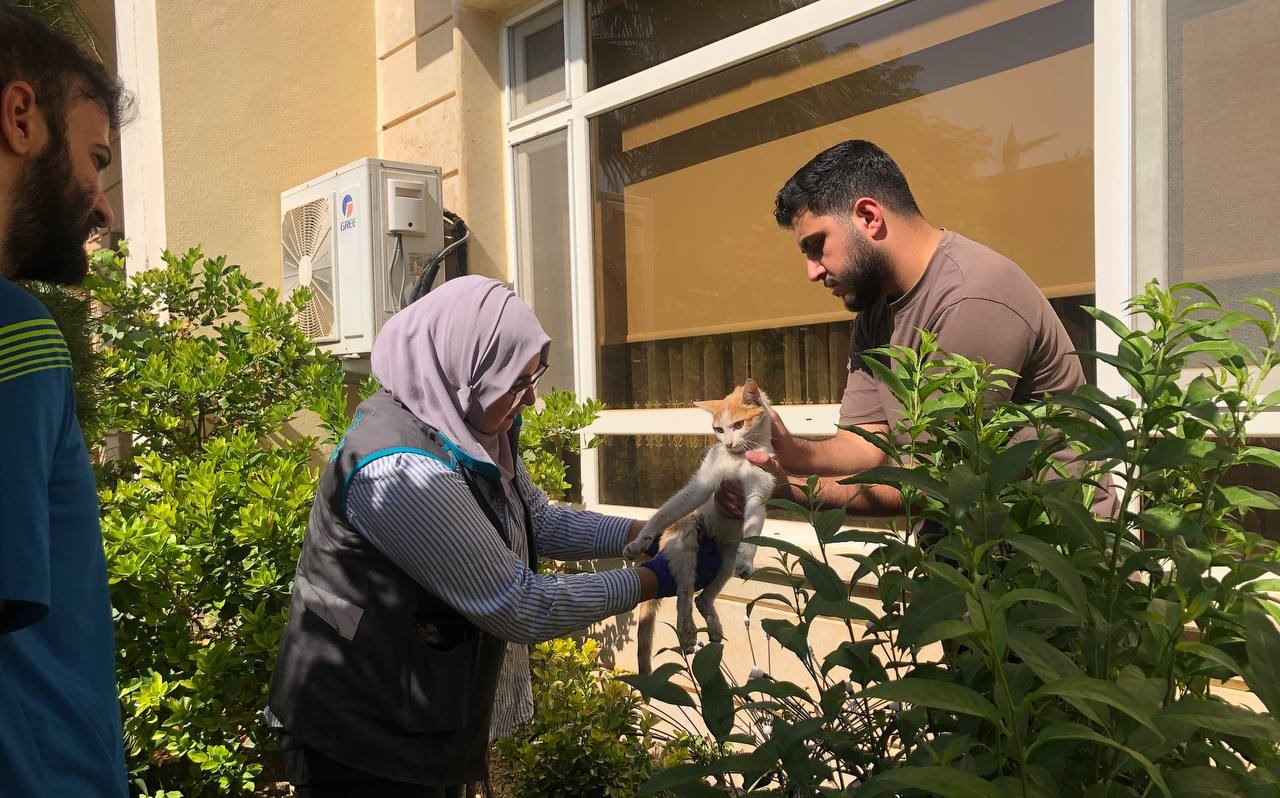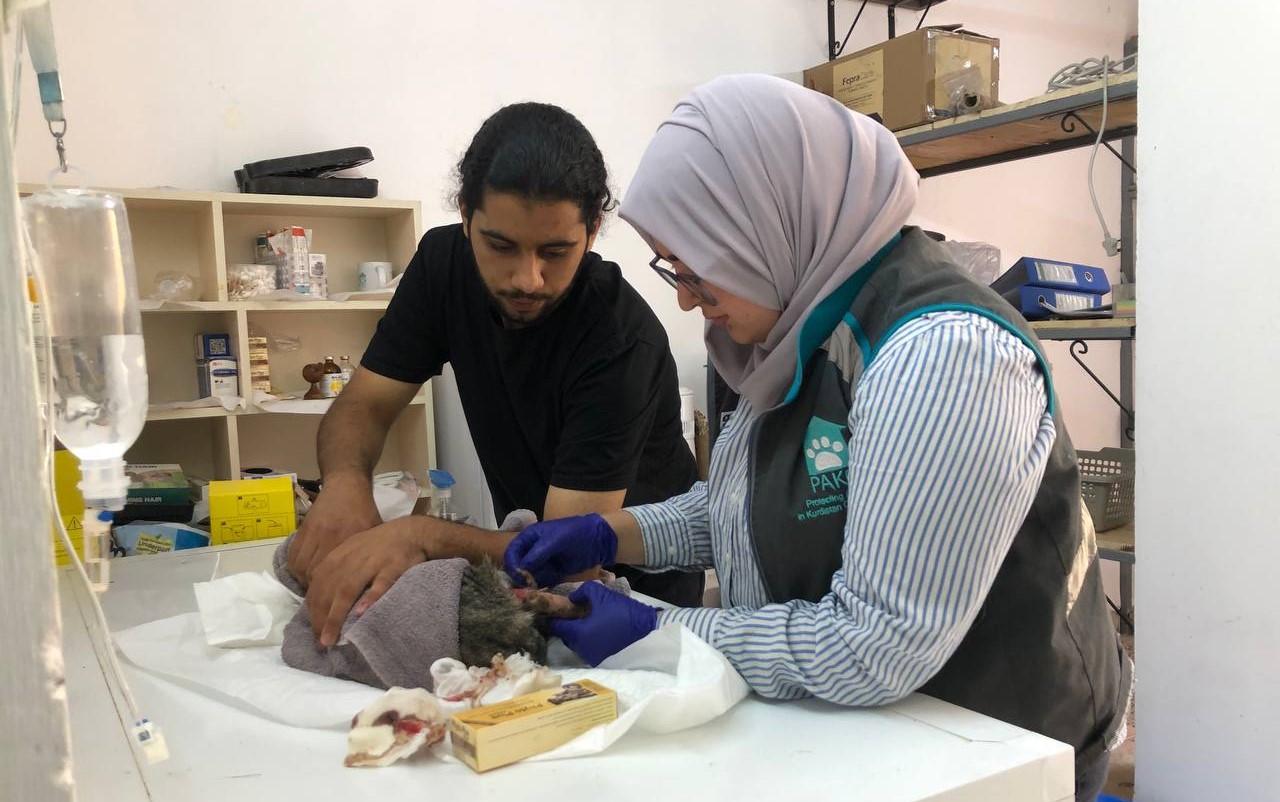
Lavin's steps are very small and spontaneous, aiming for a much larger goal. While she is concerned about protecting animals, especially stray dogs, she wants to restore balance to the ecosystem and keep people away from the risk of disease.
There are lots of stray dogs and cats in the city. It has both benefits and harms to the environment. Meanwhile, Lavin Abdul Wahab, veterinarian, has found the right solution, neither killing nor expulsion: Elimination of risks and diseases and subsequent sterilization.
“The dogs we collect are sterilized and vaccinated against rabies that can be transmitted to humans and other animals,” Lavin said. “After those treatments, they become gentle, friendly, and harmless.”
Stray dogs play a complex role in the ecosystem, both positively and negatively. They are a reason to reduce the number of predators in cities. If there are no stray dogs, rats, mice, and some other organisms will increase and become harmful to agriculture, the environment, and people.
Some of them also live on food and animal waste, which is a way to clean up the environment. However, the increase in the number of stray dogs can lead to the spread of diseases and other dangers.
Keeping dogs and cats close to people, rather than away from them, benefits the environment
A sorrow instead of everyone
Lavin is not alone. She has a group of volunteers. She founded Protecting Animals in Kurdistan Organization PAKO in 2019 and is working on her new initiative through the organization.
"People brought me sick and injured stray animals, and then the person didn't know what to do with them. Even if the person has good intentions, it takes a place, a way and treatment," he said.
Initially, she thought of having a temporary shelter for stray animals until they receive treatment because permanent shelter is not suitable for the animals and does not serve the environment.
Lavin further explained that the presence of dogs in cities and regions, preventing the appearance of wild animals and predators, and the absence of dogs, the number of cats will increase and the balance will be disturbed. The ecosystem requires all of them to exist and maintain the balance of the environment, not one weak and one strong be"
The main task of PAKO's team is to sterilize dogs so that they do not breed and their numbers increase randomly. Before that stage, they treat the animal's diseases, make sure they are not a danger to the environment and society, then release them.
“So far we have sterilized 450 dogs, but the number is large and the process requires more capacity and speed,” Lavin said of the two phases of their campaign in Sulaimaniyah, from 2020 to August 2024.
Experts, or citizens in general, rarely speak to the media on dog-related issues, or very few. KirkukNow tried for several weeks and could not get rich scientific opinions and interpretations.
The debate over the treatment of the spread of stray dogs in Sulaimaniyaha has been going on for years and has not been finally resolved.

The Sulaimaniyah Municipality opened a shelter for stray dogs in 2022, but quickly faced criticism, as the animal rescue organizations believe the shelter is a prison and a place to destroy dogs.
There was another initiative, in 2020, a number of animal rights activists, launched the project of "nest for stray animals" in Sulaimaniyahyah, which continued for a while. They put dog houses in the streets and several places in the city, to shelter stray dogs.
Several years ago, the draft law on animal protection in the Kurdistan Region of Iraq KRI was submitted to the parliament, with the aim of regulating the treatment of animals in a humane manner, protecting the natural and environmental balance, protecting animals and prohibiting their killing with bullets and poisons, and replacing it with scientific measures like sterilizing them and building shelters in order control birth and treat the issue with a balanced mechanism in order to not harm the environment.
On November 29, 2022, the Iraqi Kurdistan Parliament approved the law on regulating the treatment of domestic and stray animals, in order to protect domestic and stray animals, regulate their breeding and treatment, while protecting human safety and health, the environment and public health pets and stray animals, as well as spreading culture. But the passage of the law came three weeks after the expiration of the term of parliament and with the decision of the Federal Court to cancel the extension of the term of parliament, the law is considered abolished.
"The increase in dogs and cats is harmful because they like to be friends with people and live near them, so their increase makes it easier to transmit diseases to humans and other animals," said Shagul Abubakr, a university professor and researcher.
She, who works at the Kurdistan Institute for Strategic Studies, Scientific Research and the Earth Network, said the increase of any organism or plant in the ecosystem affects others because it needs more resources such as food and shelter at the expenses of another animal or plant.
The right method is to reduce them by a scientific method such as sterilization
"Dogs eat household waste and other waste, which causes the transmission of many diseases, because unfortunately in our country, waste is disposed of unscientifically and even hospital waste is mixed with household waste, which is the source of many diseases," Shagul explained.
Not only dogs, but cats are also an important part of Lavin's project. Since 2019, they have had one stage of sterilization of 120 cats, with the financial assistance of an animal-loving woman.
"In addition to sterilization, we treat animals daily," Lavin explained.
There are about 500 diseases called zoonotic diseases, which affect both animals and humans, so any animal that exceeds its limit in the environment, it can easily transmit diseases.
There are no official statistics on the number of stray dogs in Sulaimaniyah, the KRI and even Iraq, but the number of stray dogs in Sulaimaniyah is estimated at 10,000, according to PAKO.
The organization's workplace is located in an unfinished municipal building in one of the outskirts of Sulaimaniyah on a 400-meter building and a 2,000-meter clay courtyard. There were 20 dogs, each with health problems or amputations.
"These dogs stay here until they recover, then they are sterilized, vaccinated and released before they leave," Lavin said.
As soon as the door of the kennel was opened, all the dogs walked towards Lavin, who hugged them and sacrificed hierself. The team was all together feeding the dogs, cleaning the place and treating them.

Shagul says that when stray dogs are vaccinated, it prevents them from spreading the disease to other animals and humans. Their increase creates fear in the neighborhoods and streets and creates traffic obstacles for people and children.
She also pointed out that the increase in dogs causes them to hunt poultry and wildlife, and the decrease will be harmful and disrupt the chain of the ecosystem.
Volunteering: the key to success
What Lavin and the teams of Pako do is based on the volunteer work of young boys and girls in Sulaimaniyah, who are concerned about protecting animals and the environment.
Yad Mohammed (20), one of the volunteers, is a student in the computer department of the institute. Beside looking after stray dogs, he also provides logistics to PAKO team.
There are 67 young volunteers working in the organization, 42 of whom are girls.
The team leaves the Sulaimaniyah Cultural Factory for the market, specifically to a place where cats are treated, on the top floor of a building with 15 to 20 cats, each suffering from pain, where they serve the cats from feeding to treatment then released to somewhere else.
Nali Halo, (19), a 12th grade student, volunteers to serve cats and dogs.
“We work with Dr. Lava several days a week to treat dogs and animals that need us on the streets.”
The team is often contacted by citizens Treatment of stray dogs and cats.
He pointed to one of the cats, a black cat, who had been receiving treatment for a year because he had been injured in the engine of a car in the cold.
I am satisfied for what I am doing and I love my animals very much
Karwan Nizar, 34, resident of Raperin neighborhood of Sulaimaniyah, called Lavin's team reporting a sick cat.
"This cat is hurt. I don't know why, but it's not good. I took it to the doctor but it couldn't be treated, so I contacted them (Lavin's team) to help," Nizar said.
His love for animals, has made Jalil Abid, 45, from Basra and living in Sulaimaniyah, to volunteer for Pako's young team. He drives them and now helps them with other tasks.
The works of PAKO has encouraged other similar work; In August this year, VIM Foundation, working for gender equality, environmental protection and animal rights, in collaboration with the municipality and veterinarians, sterilized 500 stray dogs.
Like Sulaimaniyah, a shelter for stray dogs was opened in Erbil last year, but with a larger area of about 20 acres. According to statistics from the Kurdistan Regional Government, more than 3,000 dogs have been collected there.
It needs patience
From community opposition to lack of financial assistance, the obvious challenges facing the PAKO team and Lavin herself.
“People don't believe I'm volunteering, or those who know I'm volunteering think I'm wrong, but I am satisfied for what I am doing and I love my animals,” Lavin said.

Sterilization of dogs and cats, treatment and vaccination are all paid for, even food and shelter.
"There are many dogs in Sulaimaniyah, their sterilization and treatment should go faster, we do not have financial assistance, we do not have a suitable place, the municipality has given us a monthly rent where confiscated cows were kept.”
Another obstacle is the lack of a modern government plan to deal with the problem of stray dogs, shelters have become critical and according to applicable laws, including the 2013 Iraqi Animal Health Law, a committee must be formed in each province to eliminate dogs. They are stray, but it is not clear how they are killed. In some provinces they are shot dead or poisoned.
“It is very inhuman to eliminate the dogs in the way they were used,” she said. He supports sterilization to control birth.
Like Lavin's team, hundreds of people place food waste for animals, especially stray dogs, in neighborhoods, parks and open spaces every day.
Lavin believes she hasn't reached the stage of being fully proud yet. She thinks more work has to be done.
"If we have good resources and space, we will sterilize as many dogs as possible as soon as possible.
“There are people who talk a lot about this. Once we built a nest for dogs during the snowfall. We hadn't left yet when a man came and destroyed it,” Lavin said.